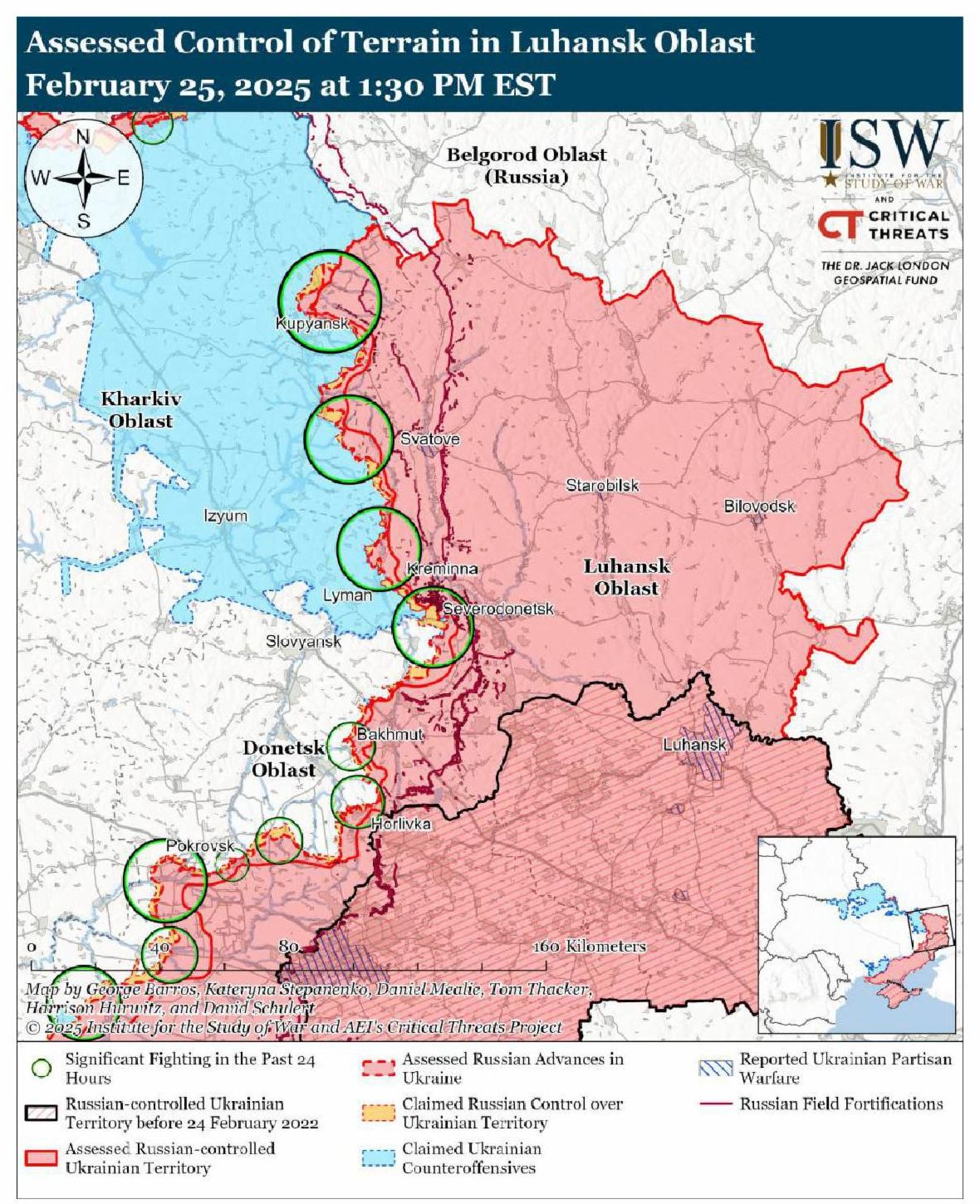Russian President Vladimir Putin implicitly acknowledged Ukrainian President Volodymyr Zelensky as the legitimate president of Ukraine and Russia's future negotiating partner while promoting a new information operation that aims to destabilize Ukrainian society and the Ukrainian military from within. Putin gave an interview with Kremlin journalist Pavel Zarubin on February 24 in which Putin stated that "elections in Ukraine are not held under the pretext of martial law" — Putin's first acknowledgment that Ukrainian law prohibits elections during martial law. Putin claimed that Zelensky is "toxic" for Ukrainian society and the Ukrainian military and that Zelensky would lose any future presidential election to other Ukrainian political and military leaders. Putin's statements are likely aimed at Ukrainian and Russian audiences. Putin's claims that Zelensky is unpopular and harmful to Ukraine are attempts to drive a wedge between the legitimate government of Ukraine and the Ukrainian military and population. Putin has repeatedly claimed that Zelensky is not the legitimate leader of Ukraine after Ukraine did not hold elections in 2024 — in accordance with Ukrainian law — as part of Russian efforts to claim that Russia cannot negotiate with Zelensky. US President Donald Trump has stated that Putin and Zelensky must engage in negotiations, and Putin is likely shifting his rhetoric in order to explain to Russian domestic audiences his decision to engage in any future negotiations with Zelensky. Putin and other Kremlin officials will likely attempt to exploit any Ukrainian military setbacks or differing opinions among Ukrainian officials to intensify this information operation and sow discord in Ukraine.
Putin attempted to use new language to repackage the calls for regime change in Ukraine that he has demanded since 2021. Putin stated during the interview with Zarubin that Russia "has nothing against" the preservation of Ukrainian statehood but wants Ukraine to "turn into a friendly neighboring state" and for Ukrainian territory to "not be used as a springboard for an attack against Russia" in the future. Putin's calls for Ukraine to "turn" into a "friendly" state demonstrate that Putin is still calling for the removal of the democratically elected government in Ukraine and the installation of a pro-Kremlin government. The Kremlin has previously used thinly veiled calls for "denazification" to demand regime change in Ukraine, and Putin appears to be using new language to make these same demands. Putin has demanded Ukrainian regime change since Summer 2021.
Key Takeaways:
- Russian President Vladimir Putin implicitly acknowledged Ukrainian President Volodymyr Zelensky as the legitimate president of Ukraine and Russia's future negotiating partner while promoting a new information operation that aims to destabilize Ukrainian society and the Ukrainian military from within.
- Putin attempted to use new language to repackage the calls for regime change in Ukraine that he has demanded since 2021.
- Putin offered to make a deal with the United States on Russian rare earth minerals as part of efforts to outbid Ukraine on this matter and to push the United States to accept Russian offers of economic measures in lieu of any actual Russian concessions on Ukraine.
- Putin attempted to claim that he supports Europe's participation in negotiations on Ukraine while continuing to show his unwillingness to make concessions and seemingly proposing Russian allies as possible future negotiating parties.
- Kremlin officials continue to exploit diplomatic engagements with Russia's allies to reinforce Moscow's narrative that Russia invaded Ukraine to protect Russian-speaking minorities in Ukraine.
- A delegation from North Korea's Workers' Party of Korea (WPK) arrived in Moscow on February 25 at the invitation of Russia's ruling party, United Russia, amid reports that North Korea may be shipping more material to Russia.
- Western officials continue to highlight the scale of European military aid to Ukraine.
- Russian forces recently advanced in Kursk Oblast and near Kupyansk, Lyman, and Velyka Novosilka, and Ukrainian forces recently advanced near Kupyansk.
- Samara Oblast authorities reduced one-time payments to soldiers who sign military service contracts with the Russian Ministry of Defense (MoD) after temporarily increasing these payments in January 2025.
- The BBC Russian Service reported on February 25 that over 100 Russian government, military, and security officials accused and convicted of various corruption charges are fighting in Ukraine.
- The Kremlin continues efforts to use its "Time of Heroes" program, which places veterans of the war in Ukraine in government positions, to form a new Russian elite composed of loyal and ultranationalist veterans that will continue to militarize Russian society over the long term.
- Russia may be reopening a Soviet-era submarine base in occupied Crimea.
| 




 [ISW] 러시아의 공세 캠페인 평가, 2025년 2월 26일
[ISW] 러시아의 공세 캠페인 평가, 2025년 2월 26일
 [ISW] 이란 업데이트, 2025년 2월 25일
[ISW] 이란 업데이트, 2025년 2월 25일